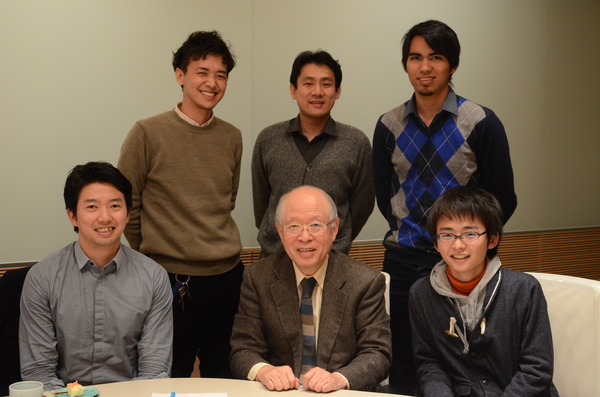University Professor Ryoji Noyori (President of RIKEN), a Nobel Laureate in Chemistry (2001), hosted the third Noyori Academy Salon on January 20, 2014. At the meeting, Prof. Noyori and four students from various backgrounds openly discussed the topic "the mission of scientists." Prof. Noyori explained that everything is constantly changing, and scientists are required to contribute toward the creation of new social values and the continued existence of all humankind by new developments in technology.

"Cooperation with Education and Economy, along with Research"
Shinichiro Ishida (third-year student at the Graduate School of Law)
Although I have majored in humanities, I learned the importance of studying more about sciences. What is the difference between science and technology, Prof. Noyori?
Prof. Noyori
When you learn about something you don't know, you come up with more questions on the topic. Studying science is learning something you have never known. Technology is the art of mastery based on the five senses. Science reaches for truth by digging deep into knowledge, whereas technology builds on the basis of knowledge. Technology is built on science, and therefore, they are associated.
Gerardo Urbina (freshman at the School of Science, from El Salvador)
People from developing countries like me study in developed countries when they want to do research. Without money, research is not possible in developing countries. Currently we are caught up in a downward spiral. What do you think scientists should do in such countries?
Prof. Noyori
It is a very good question. When a country exports products, it gains money. Human resources are unfairly distributed. Many Japanese people also study in the US and work there. The bad cycle occurs because universities and industrial firms have not treated people well in Japan. For an individual, the decision to study and work in a foreign country might benefit her/him; however, for the home country, it is a loss of human resource. A balance should be sought between import and export in human resources, money, and products.
Kei Takeno (first-year Ph.D. student at the Graduate School of Science)
I wonder if it is right for scientists in developed countries to be involved in forming educational ideals in developing countries.
Prof. Noyori
Researchers want to work in good research environments and under good working conditions. Why did researchers like me go back to Japan from the US during the Showa period (1926-1989)? Although there were many industrial firms in the US that allowed Japanese researchers to concentrate on research, we returned to Japan because we had the mettle to rebuild our country with science and technology.
Takumi Sato (freshman at the School of Science)
I have not yet decided whether I should choose physics or chemistry; however, I like science as a whole. I would like to convey how exciting science is. What can I do to realize my motivation?
Prof. Noyori
People cannot understand what scientists do if scientists only research and write academic articles. In the field of music, composers write music, and players and singers give musical performances. Many scientists simply write articles and do not communicate with people. We should communicate more with people in many fields such as education, economics, and politics.
Original article was published in the Chunichi Shimbun on January 21, 2014.